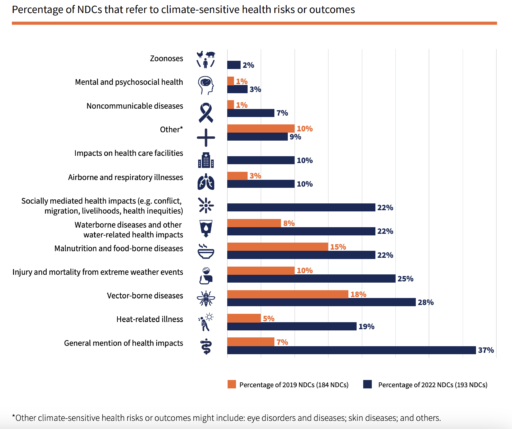This website uses cookies so that we can provide you with the best user experience possible. Cookie information is stored in your browser and performs functions such as recognising you when you return to our website and helping our team to understand which sections of the website you find most interesting and useful.
Catalysing climate action to protect mental health: Launch of report on mental health in Nationally Determined Contributions
By Alessandro Massazza, Policy and Advocacy Advisor, Environment and Climate Change

Meenu, a farm worker, and her father use the water pumped from a solar water pump at their farms in Karnal State, India. Image Credit: Prashanth Vishwanathan / IWMI
More and more countries now recognise the link between mental health and climate change. But very few have plans about how to address it. This report is designed to help countries identify how addressing climate change across sectors within NDCs can help unlock extensive co-benefits for mental health.
What are Nationally Determined Contributions (NDCs)?
Nationally Determined Contributions or NDCs are the main tool for countries to collectively address climate change. Under the Paris Agreement, countries are mandated to submit their climate plans every 5 years. NDCs lay out how each country will contribute to the goals of the Paris Agreement to limit global warming to 1.5°C above pre-industrial levels by reducing greenhouse gas emissions.
In 2025, countries are due to submit to the UNFCCC their third iteration of NDCs (NDCs 3.0) with climate plans and targets extending to 2035. Only 15 out of the 195 countries that are part of the Paris Agreement met the deadline of the 10th of February to submit their NDC 3.0 meaning many countries are still actively working on their documents.
Current climate action is not sufficient to protect our health. According to the 2024 UNFCCC NDC Synthesis Report, if national climate plans for 2030 were fully implemented, global temperatures would still reach 2.1-2.8°C above pre-industrial levels by the year 2100, with profound negative consequences for our physical and mental health.
How has mental health featured into NDCs to date?
According to a review of health into NDCs conducted by the World Health Organization in 2023, only 3% of NDCs to date include a reference to mental health. This makes mental health one of the least included health outcomes, when compared to other physical health outcomes such as vector-borne diseases (included by 28% of NDCs).
The WHO review highlights how:
“The impact of climate change on mental and psychosocial health remains under-represented in NDCs (3%, five out of 193). This finding is in line with the 2021 WHO health and climate change global survey, which found that of 40 reviewed national health and climate change plans only nine have so far included mental health and psychosocial support as a priority”.

Graph from the 2023 WHO Review of Health in Nationally Determined Contributions and Long-Term Strategies outlining the percentage of NDCs referring to climate-sensitive health risks and outcomes
United for Global Mental Health report: “Mental Health in Nationally Determined Contributions: Current State and Opportunities for Integration”
To advocate for more countries to integrate mental health considerations into their NDCs, United for Global Mental Health has published a report providing policy makers with an overview of mental health in NDCs to date as well as possible entry points for the inclusion of mental health in NDCs.
Key insights from the document include:
- The majority of NDCs include mental health in the context of highlighting the negative impacts of climate change for mental health, but very few expand on which actions and responses countries are implementing to safeguard mental health from the impacts of climate change.
- From agriculture to transport, from education to waste; addressing climate change across sectors within NDCs can help unlock extensive co-benefits for mental health. The report provides concrete recommendations and suggested wording on how mental health could be integrated across sectors addressed by NDCs including energy, transport, food and agriculture, urban spaces and cities, water, and many others.
We cannot protect mental health unless ambitious climate mitigation takes place. We hope you will join us in calling on countries to capitalise on the NDC process to step up their climate action – protecting the planet as well as our physical and mental health.
